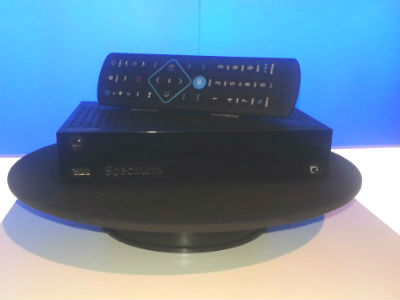Charter Nears Spectrum Guide, Worldbox Rollout
The smarter way to stay on top of the multichannel video marketplace. Sign up below.
You are now subscribed
Your newsletter sign-up was successful

Charter Communications’s rollout of its cloud-based Spectrum Guide and new “Worldbox” platform is admittedly behind schedule, but the operator is closing in on launching that product pairing in two markets, Tom Rutledge, Charter’s president and CEO, said on Thursday’s Q3 earnings call.
Spectrum Guide and the Worldbox (pictured), a hybrid QAM/IP device that uses Charter’s new downloadable security system, is being rolled out in St. Lois, Mo.; and in Reno, Nev., “imminently” he said.
Charter hinted in recent FCC filings that Worldboxes were starting to move out into the field, but with respect to the new UI/box mix, Charter is about six weeks behind its original rollout schedule as the MSO irons out software issues, Rutledge said. Earlier this year, Charter said it was also testing Spectrum Guide in Fort Worth, Texas.
Charter had hoped to have Spectrum Guide in front of 1.6 million subscribers this year, but “I don’t think that’s realistic or desirable at this point, given where we are starting,” Rutledge noted. “The plan is to roll it out as rapidly as we can operationalize it.”
So far, that delay does not seem to have hurt Charter, which bucked industry trends by adding 12,000 video subs in the third quarter.
Working primarily with ActiveVideo, a cloud video and apps vendor now owned by a Arris-Charter joint venture, Charter intends to offer the new UI across its set-top base, including non-IP digital boxes that rely on MPEG-based transport. Cisco Systems, which is selling its CPE business to Technicolor, and Humax are the known suppliers of Charter’s new Worldbox.
Rutledge did not shed more light specifically on the MSO's trial of Spectrum TV Stream, a skinny TV product for broadband-only customers that start at $12.99 per month and bundles in a free Roku 3 streaming player.
The smarter way to stay on top of the multichannel video marketplace. Sign up below.
But he did note that Charter’s Q3 numbers don’t factor in trial-related activities, while adding “We sell cable television services using IP technology and MPEG technology…What we’re selling is cable television in applications.”
Regarding apps, he said 1.4 million subscribers have downloaded TV Everywhere from Charter to receive services on iOS and Android devices as well as the Roku platform.
Rutledge also reiterated Charter’s position on usage-based broadband pricing: it doesn’t do it now, and has no plans to alter that stance.
“We don’t do it,” Rutledge said. “We don’t do it because we want to sell more services. That’s our business model.”
